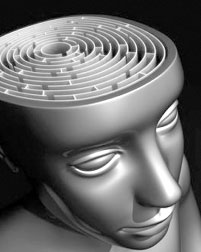|
 Donít Forget! Donít Forget!
The nature of memory power
by Amal Hewavissenti
During our youth, we naturally
bring to bear plenty of mental energy on mapping out plans for the
future and in old age, our memory keeps us happy or sad about the past
experiences, pleasant or unpleasant.
This, in fact, is the nature of our memory. It makes us happy or sad
and can remain with us until we are on the threshold of death. It is
possibly true to say that our memory is absolutely a storehouse where
the best of our experiences are stored, analysed, enjoyed and processed
for successful decisionmaking.
Someone might be sitting alone in a room reflecting on his/her
spectacular experiences or future plans to be carried through at the
right time. However he/she isnít realy alone!
The memory itself is talking with him/her, giving a big chance to
live through past experiences again in imagination. It is always
advisable to correctly identify weak aspects of oneís memory and train
them to create a powerful memory and powerful imagination.
Some people, in general are forgetful of routes or places in our
country while some others fail to recall certain words or names though,
they succeed marvellously in recalling other things far better than
others do.
Memory tells us what we are and what we are capable of doing. We
canít even imagine the macabre situation that arises when our memory
obliterated completely.
 The sensations of happiness, sadness, fear or love are such that a
human would be reduced to the state of an insensitive robot or a
lifeless piece of iron. The sensations of happiness, sadness, fear or love are such that a
human would be reduced to the state of an insensitive robot or a
lifeless piece of iron.
All our experiences whether agreeable or disagreeable, the things we
have got to know, and things we have enjoyed must be stored in our
memory to exploit them to achieve what we expect in life. Unless there
is a purposeful learning from an experience, there is under no
circumstance, a living and practical content in memory.
Therefore, some psychologists assert that we must develop a high
level of necessity and concern for what we are trying to keep in memory.
To train the memory, one should repeatedly recall what should be in
it and organise the content to be permenantly stored. The underlying
truth is that the chance of a particular thing to be well stored in the
memory depends largely on the personís liking, necessity and enthusiasm
towards that thing. In that sense, recalling with an honest need will
produce an amazing memory power and will play its part exceptionally
well in oneís moves to achieve something.
However, once it is overloaded there is a chance that everything will
be erased, as even memory has a limited scope to keep things in it.
Memory power is best nourished during a good sleep which reorganises and
permenantly stores what we have learned or absorbed as important. During
a sound sleep, the brain or the body is not exposed to any experiences
or any disturbing factors.
This notably brings down the common forgetfulness. For a student
studying for an examination recalling what he has just learned is highly
rewarding. He/she can retain what he has studied by recalling it after
two days, doing an exercise in a week, recalling it again in the course
of the month and so on.
 This clearly shows that not only mental preparation but also physical
preparation is vital to retain something in the mind for a long time. This clearly shows that not only mental preparation but also physical
preparation is vital to retain something in the mind for a long time.
However, a memory power that goes beyond the limits is also something
that blocks oneís progress. It is generally accepted that a person who
is full to the brim with knowledge (essential and unessential) and
remains lethargic is a problem.
A person with too much memory power may prefer an inactive life and
thereby becomes an incomplete man; what the society needs a group of
people who have developed their memory power and a wonderful awareness
of how to put it into practice.
Forgetting a certain amount of what we have experienced is a natural
mechanism of balance. We must forget less important things to make room
for new dynamic experiences in our memory. Every year, we empty to some
extent the vessel of our memory and fill it with fresh experiences and
fresh knowledge because ours is not a computer memory. |

